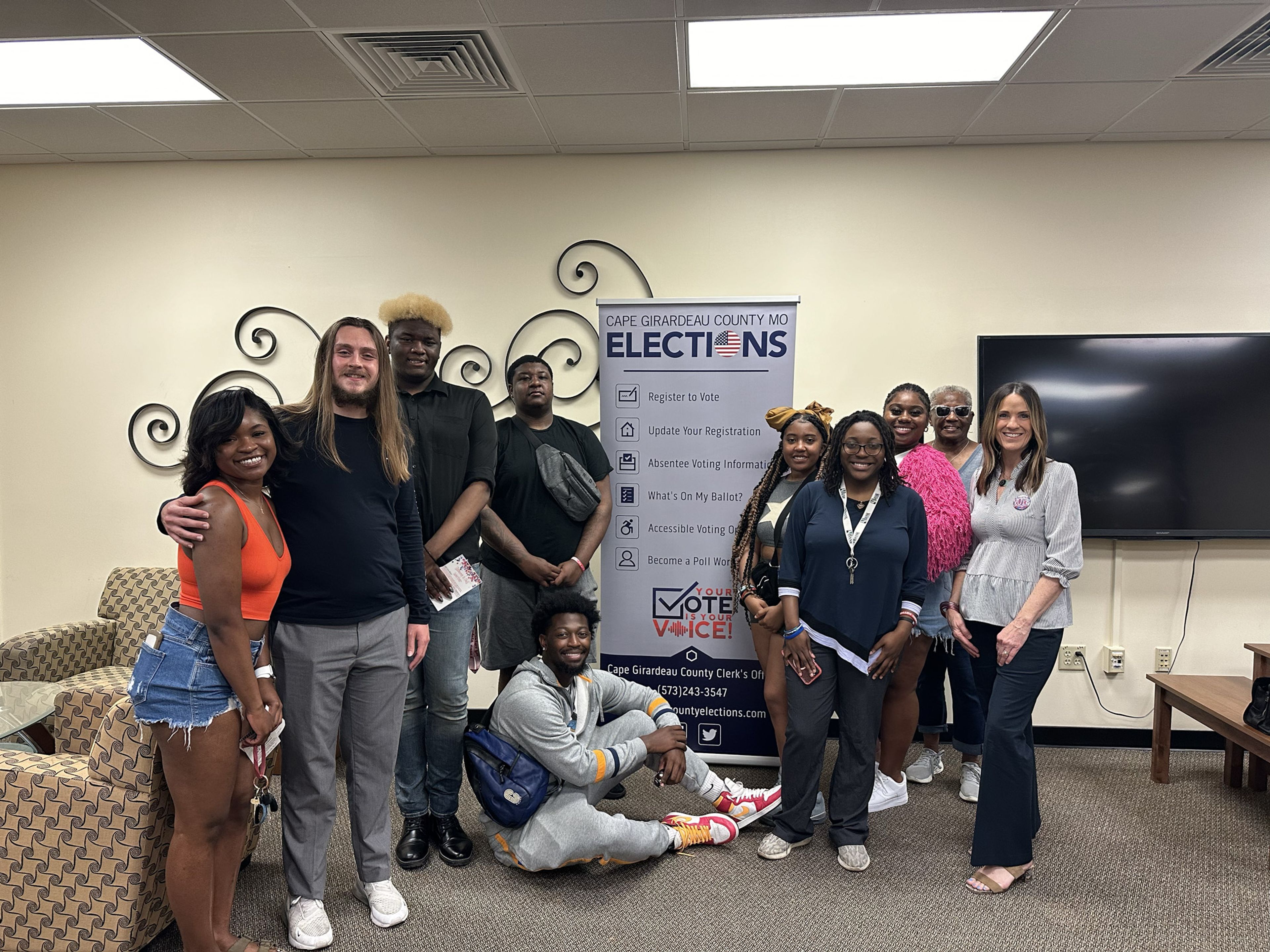Dr. Franklin Delano Nickell came to Southeast Missouri State University to replace a history professor at Southeast, and he planned to stay for only one year -- that was 43 years ago.
Nickell said he has some boxes that have yet to be unpacked, like he is still waiting to move.
Prior to coming to Southeast, Nickell left his home in central Illinois to start fresh with his wife in New Mexico. He taught at a high school in Albuquerque for 12 years.
Nickell, a Southeast history professor and director of the Center of Regional History, has become an expert on the southeast Missouri region. He was exposed to the region when he was asked by the university president Dr. Mark Scully to assist in a Head Start project.
Nickell spent a summer and fall traveling the region that spanned from Cape Girardeau south to Arkansas and from the Mississippi River to the area of West Plains, Mo., visiting the 27 Head Start sites, learning about the program, what it entailed and about the region itself.
"I began to crisscross southeast Missouri and go all over the area," Nickell said. "I went places I never heard of before: Tallapoosa, I went to Puxico, I went to Caruthersville, I went to Wardell, tiny little towns. ... So my task was to renew the contracts, change them to the SEMO system and learn, first of all, about the region, how big it was and what its nature was, and I would just have to stop sometimes and look at the landscape and say 'What is this?'. ... I've been studying ever since that time frame. We worked for the whole summer and fall, and I crisscrossed Southeast about every which way, and that was my exposure to the region."
While visiting and evaluating the various Head Start sites, Nickell requested that three teachers not continue teaching the following year. Nickell reported this to his boss and within 10 days Southeast had letters from each teacher's attorney saying that they would sue. Because of this and Scully realizing how much time and work the project would entail, Scully ended Southeast's work on the program.
In only a matter of weeks after Nickell stopped working on the Head Start project, the university bursar had a heart attack and over Christmas break the university treasurer asked Nickell to take over because he had done so well at managing Head Start.
Nickell said he had to ask what a bursar was at first but ended up taking the job. A bursar is financial administrator in a university.
"You come in and sit down at 8 o'clock at that desk, the phone will ring at 8:05, you answer and you'll be the bursar and just figure it out,'' Nickell said. "That's what happened. So for three and a half years I was the bursar of the university dealing with credits and debits and canceled checks and tuition and dormitory receipts and athletic funds and Coke machines."
Nickell was asked to replace the university's retiring treasurer at the end of those three and a half years. Nickell said he learned a lot from being in charge of the incoming university money, but he chose to go back to the classroom and replace a history professor who died.
"One of the first things I said when I came back in was we need to do something to increase our presence in the region because they don't think of us as our college," Nickell said. "Two years later I became department chair. I then said we must make some changes, and so we started a program in historic preservation and then we started a Center for Regional History, and I was the department chair and those two were no small items to get out of the way, but we did it. And we've changed a lot of lives with those two programs."
Nickell said a few years later the director of the Center for Regional History left, and he was told that if he did not take over as the director, the center would close down.
"It shouldn't be closed because the potential was very great," Nickell said. "So I said I'd do it for no more than five years. So that was 20 years ago, and I'm still doing it."
After 55 years in education, Nickell will retire from Southeast on Jan. 1, 2013, when he will start working for the State Historical Society of Missouri.
The historical society will establish field offices in the areas of the state with limited participation, membership or financial support such as southeast Missouri and northeast Missouri.
"About the time they went into a crisis, the federal judge, young Steven Limbaugh, became president of the board of directors of the state historical society," Nickell said. "He's the judge here in the Limbaugh federal courthouse. He's an ardent supporter of Cape Girardeau. That's where his family has lived for 100 years or 120 years, and so he has become a champion of this so he has worked with the state historical society to get them to commit to establish an office here in Cape and asked if I would help them get it started, and I said I would."
Nickell will be a representative in this area to try to increase visibility of the state historical society.
"That will be kind of fun because I have been doing some of that here at the Center for Regional History, which we've had up and worked since 1990."
Nickell said he has enjoyed what he has done at Southeast, and that he has not only learned a lot but also has met interesting people and is still fascinated by the southeast region.
"I've been thinking about retiring for a long time, and this is a good time to do it.," Nickell said. "My wife died last year and it was a devastating blow to me, more so than I imagined. So it's a good time to make a change, and so that's what I'm doing.
"The opportunity to go to work for the state historical society came along, and I'm looking forward to that. It'll be something different, and I won't have to grade those infernal papers, and I can still do some teaching in a fashion and I can still study the region. I can still interpret the region, I can still work with people in this region. I think that will bring me great satisfaction."
The bootheel was once a swampland, and the landscape has transformed. Nickell said it has been fun to watch the changes take place and to see how this area is growing.
There are 114 counties in Missouri and Nickell explained that seven of those in the bootheel produce one-third of all the agricultural income in the entire state of Missouri because of the rich topsoil. He estimates that over time those counties will become even more important than they are now.
"It's important that we take care of the land, that we care for the people who live here and that we help those people whose lives have been changed from slaves to sharecroppers to poverty-stricken individuals, who have been trapped here with no place to go," Nickell said. "We have the worst poverty problem of any region in the state. We have the highest murder rate with the exception of downtown St. Louis. The life expectancy of a baby born in Pemiscot County is the shortest life expectancy for a baby in any county in the United States. There are no HMOs, there is a shortage of medical doctors, hospitals are inadequate."
Nickell feels strongly that there is hope for the southeast Missouri region.
"If our institutions catch up, including our colleges and secondary schools, there may be major progress here. All of these problems in southeast Missouri are in the service area of this university, so we have a major obligation in my mind to help this region. We are a regional university whether we like it or not."





